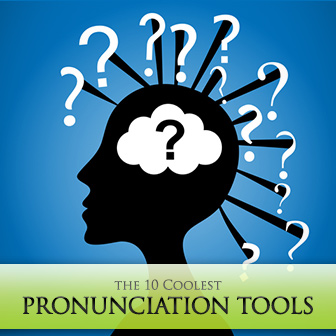The 9 Best Online Resources for ESL Pronunciation Practice


Many of these they can practice with the use of self-study materials. They can do as many grammar exercises as they want; they can work with audio and video to improve listening; they can even join native English speakers in their free time for some extra speaking practice. But it is not likely they will correct your students’ pronunciation. Pronunciation is one of those things that only teachers correct – in the classroom. Friends and acquaintances will usually let pronunciation mistakes slide for the sake of keeping the conversation flowing.
So what can your students do in their self-study time to improve their pronunciation? In today’s technological age, the best solutions to any of our problems are usually found online or in apps. And here some pronunciation tools you can recommend to your ESL students.

Published by Macmillan Publishers, Sounds: The Pronunciation App is probably the most popular pronunciation app in the market. The app features an interactive phonemic chart in both American and British English, a “How do you say…” option that allows students to not only listen to how a word is pronounced but also record and playback their own voice, and even the possibility to buy additional wordlists once they have mastered the ones included in the app. Available for iPhone, iPad, iPod Touch and Android devices. There’s a free download, but it only offers some of the features.
Developed by Oxford University Press, this app also allows students to switch between American and British English. It features an interactive sounds chart, over 200 sample words and a pronunciation game, and gives students the option to record and playback their own voices. Available for Android and iPhone, iPod Touch and iPad. The free demo comes with limited functionality.
Pronunciation: Clear Speech was developed by Cambridge University Press and provides a little more fun in pronunciation practice. It includes four games students can choose from for intermediate English pronunciation. Available for iPad, iPod Touch and iPhone. There is another version for pre-intermediate learners, Basic Pronunciation: Clear Speech from the Start.
The online dictionary, howjsay, is also available for download from iTunes and GooglePlay. This app features over 150,000 entries (the largest English pronunciation dictionary in the world!), all easily accessed with just one click.
Pronunciation King is an app that comes in two versions, one for UK English and one for US English. This app is very easy to use and works offline.

How do you pronounce “Friedrich Wilhelm Nietzsche”? Pronounce It Right will tell you exactly how! This is a website that takes the guesswork out of pronouncing the names of famous composers, philosophers or writers. And good news! There’s also an app available for Android and iPhone, iPad or iPod Touch. The app comes with 1000 famous names and works offline.
Within its Learning English site, the BBC offers excellent pronunciation tips and opportunities for British English pronunciation practice, featuring the sounds and features of English pronunciation as well as interactive quizzes and three radio programs. An invaluable resource for both ESL students and teachers.
Rachel’s English is a website I can’t recommend enough. In her series of free videos, Rachel shows students not only how to pronounce specific consonant or vowel sounds, she also covers all aspects of intonation and stress. This website is the ideal companion for any student who wants to devote some extra time to pronunciation practice.
The aubergine is a vegetable in British English and more difficult to pronounce than its American counterpart, the eggplant. The Septic’s Companion offers definitions of common British English slang, including foods, sport and places. Not recommended for children as it includes colorful insults as well.
At Inogolo.com students will be able to hear the English pronunciation of names, places and a variety of other things. They also have very interesting pronunciation guides, in which students can hear the pronunciation of words and names in a variety of topics.
They’ll be too eager to practice as these apps and websites certainly make pronunciation more fun!
Have you ever used these or other websites/apps? If you have, please share your experience below!